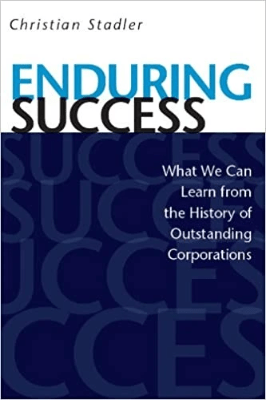
Professor, Author, Speaker.
About Me
I am a professor of strategic management at Warwick Business School. My new book Open Strategy. Mastering Disruption From Outside The C-suite will help you to adjust to a new and more open world. I share my ideas with executives and students across the globe as well as through TV (e.g. CNN, BBC, Al Jazeera), print (e.g. Harvard Business Review, New York Times, Wall Street Journal), and a regular Blog on Forbes. Thinkers50 – the premier ranking of the most influential living management thinkers in the world – listed me as a future thinker in 2013 and shortlisted me for the strategy award in 2021.
Books
In the ancient Chinese manual The Art of War, military strategist Sun Tzu advised generals to keep their plans to themselves if they wanted to defeat their adversaries. But what if he was wrong?
Get ready for a new and more transparent world. Open up your strategy.

buy on Amazon (watch video)
"This book shows how a strategy can be shaped around openness. Very insightful." —Francesco Starace, CEO of Enel
"This is the first strategy book I’ve read which seems to know what kind of world we are living in today." —Margaret Heffernan, author of Uncharted

"Christian analysis of business history is a source of inspiration for the future." —Jeroen van der Veer, former CEO of Shell
"Christian has a great skill for blending extensive empirical research with interesting case examples and coming out in the end with practical ideas." —Chris Zook, author of The Founder's Mentality
Articles
My research examines how organizations can achieve sustainable competitive advantage. I am particularly interested in questions related to diversification, capabilities, and innovation.
For Managers
- When AI Gets A Board Seat. (with Martin Reeves) Harvard Business Review
- Three Lessons From Chatting About Strategy With ChatGPT (with Martin Reeves) Sloan Management Review
- Open Up Your Strategy (with Julia Hautz, Kurt Matzler and Stephan Friedrich von den Eichen) Sloan Management Review
- A User’s Guide to Open Strategy (with Julia Hautz, Kurt Matzler and Stephan Friedrich von den Eichen) Harvard Business Review
- 3 Strategies for Rolling Out New Tech Within Your Company (with Connie Helfat and Gianmario Verona) Harvard Business Review
- 3 Things Driving Entrepreneurial Growth in Africa (with Klingebiel) Harvard Business Review
- A Century of Champions and Unicorns Developing Leaders
- Few Companies Actually Succeed at Going Global (with Mayer and Hautz) Harvard Business Review
- What Western Investors Want from African Entrepreneurs (with Klingebiel) Harvard Business Review
- Why Good Leaders Don’t Need Charisma (with Dyer) MIT Sloan Management Review
- Four Principles of Enduring Success Harvard Business Review
For Academics (complete list here)
- Transferring knowledge by transferring individuals : innovative technology usage and organizational performance in multi-unit firms (with Helfat and Verona) Organization Science (2022)
- International and product diversification: Which strategy suits family managers? (with Mayer, Hautz, and Matzler) Global Strategy Journal (2018)
- Africa: the new frontier for global strategy scholars (with Mole and Arino) Global Strategy Journal (2017)
- Are product and international diversification substitutes or complements? (with Mayer and Hautz) Strategic Management Journal (2015)
- The impact of family ownership, management and governance on innovation (with Matzler, Veider, and Hautz) Journal of Product Innovation Management (2015)
- The impact of dynamic capabilities on resource access and development (with Helfat and Verona) Organization Science (2013)
- Process Innovation and Integration in Process-Oriented Settings: The Case of the Oil Industry Journal of Product Innovation Management (2011)
Teaching
I teach strategy and innovation. Warwick Business School's Executive MBA (where I teach the core strategy course) is currently ranked Nr. 2 in the UK (10th in the world).
Previous guest speakers in my class:
- Dominique Heintz, CSO Audemars Piguet
- Warren East, CEO of Rolls Royce
- Ian Davis, Chairman of Rolls Royce and former Managing Director of McKinsey
- Mark Moody-Stuart, former CEO of Shell
- Chris Zook, Head of the Global Strategy Practice at Bain & Company
- Ralf Speth, CEO of Jaguar Land Rover
- Martin Reeves, Managing Director Boston Consulting Group
- Robert Fry, former commander of the British Troops in Iraq
Check out short strategy videos on my YouTube Channel - for example:
Scenario Planning
Keynote Speaking
I passionately belief in the power of ideas. In my keynote speeches I typically tell stories to capture the imagination of the audience and then draw broader lessons from them. My three favorite topics: How leaders can succeed in current world of uncertainty (my suggestion is through openness), how leaders can set their companies for enduring success, and opportunities in Africa.
For speaking inquiries, please email Stern Speakers.
Open Strategy will help you to master disruption from outside the C-Suite. Here is how.
Few companies succeed for 100 years. This is a story about some that did.
Africa is on the rise. Here is why.
Copyright 2015

















